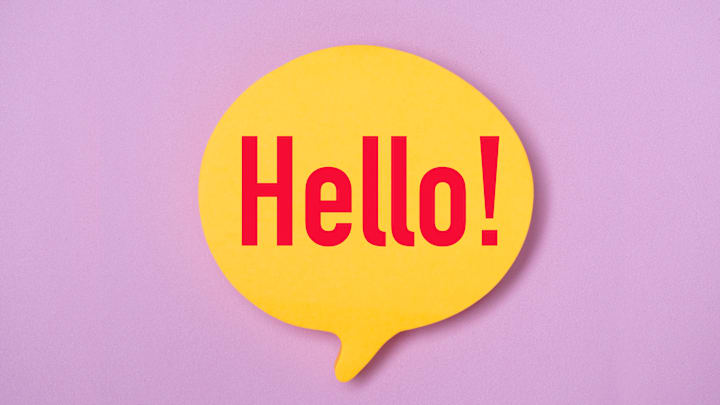First impressions are important, so why be boring when there are so many other ways to greet a person and forge a unique connection? Forget hello and try one of these salutations instead.
1. What’s the craic?
How they say “What’s up?” in Ireland. The craic (pronounced “crack”) is the news, gossip, latest goings-on, or the fun times to be planned.
2. How hops it?
Be classically cool with this phrase, which is late 19th-century slang for “How’s it going?”
3. Ahoy

Add a little jaunty excitement by getting into pirate mode. (Fun fact: Ahoy was the word inventor Alexander Graham Bell wanted people to use when they answered the telephone; hello took off in part thanks to the influence of Thomas Edison.)
4. [Hat Tip]
Be the strong, silent type and forgo words entirely with an elegant tip of your hat. (If you take your hat off entirely when greeting someone, that's known as hatting.)
5. Ciao

Feeling friendly and cosmopolitan? Ciao—which is both a greeting and a way to say goodbye—will set the mood. Add a kiss on each cheek for authenticity.
6. Chello!
Cassell’s Dictionary of Slang doesn't quite know what to make of this ’80s slang term, which could either be a purposeful mispronunciation of the word hello or a spin on ciao.
7. Wotchero!
A British slang term for hello dating back to the 18th century. It derived from wotcher, a Cockney greeting used a couple hundred years earlier.
8. S.P.D.S.V.B.E.E.V.
Want to write a letter with a classical Latin feel? Open with this abbreviation for Salute plurimam dicit. Si vales, bene est, ego valeo, which means, “Many greetings. If you’re well, then that’s good, and I’m well too.”
9. Salutations
Show off your verbal dexterity with this gentleman’s greeting, which dates back to the 14th century.
10. Howdy

Keep it casual, cowpoke, or get fancier with a full-on Howdydo? Howdy is dervied from an older, now-obsolete phrase, how-do-ye, from the 16th century.
11. Aloha
Bring a little mellow sunshine to your interactions by greeting the Hawaiian way. Aloha means love, and the word was first used as a greeting in 1820.
12. Namaste
This greeting comes from the Sanskrit for “I bow to you.”
13. How’s tricks?
You’ve got to smile when you dust off this gem, which according to The New Partridge Dictionary of Slang and Unconventional English may have nautical origins but is more likely related to playing cards.
14. Breaker, Breaker

Open the conversation like a trucker on a CB radio.
15. Howzit?
This shortening of the phrase how is it? dates back to 1935.
16. Cheerio!
The history of this friendly greeting goes all the way back to the 15th century, when people would ask “what cheer?” or “what cheer with you?” upon meeting someone else. Eventually, it was shortened to cheero and was used mostly on ships, both as a greeting and as a way of getting somone’s attention. Finally, cheerio hit the scene in the early 20th century.
17. Honk honk!

A British phrase mimicking the sound of a goose that did double duty as a greeting and farewell; it originated in the 1830s.
18. How are you diddling?
This informal greeting comes straight from 1970s slang.
19. Gratulation
Back in the 16th and 17th centuries, a gratulation was “a joyful greeting,” according to the Oxford English Dictionary.
20. Coucou
There are many ways to say “hello” in French, but if you’re talking to a good friend or a family member, opt for salut, quoi de neuf, or coucou, which are all more informal than bonjour.
A version of this article ran in 2014; it has been updated for 2023.
